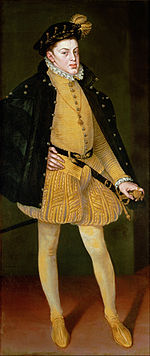Carlos, Prince of Asturias
| Carlos | |
|---|---|
| Prince of Asturias | |

Portrait by Alonso Sánchez Coello, 1564.
|
|
| Born |
8 July 1545 Valladolid, Spain |
| Died | 24 July 1568 (aged 23) Madrid, Spain |
| Burial | El Escorial |
| House | House of Habsburg |
| Father | Philip II of Spain |
| Mother | Maria Manuela, Princess of Portugal |
| Religion | Roman Catholicism |
Carlos, Prince of Asturias, also known as Don Carlos (8 July 1545 – 24 July 1568), was the eldest son and heir-apparent of King Philip II of Spain. His mother was Maria Manuela of Portugal, daughter of John III of Portugal. Carlos was mentally unstable and was imprisoned by his father in early 1568, dying after half a year of solitary confinement. His fate was a theme in Spain's Black Legend, and inspired a play by Friedrich Schiller and an opera by Giuseppe Verdi.
Carlos was born at Valladolid on 8 July 1545. His mother, María Manuela of Portugal, died four days later from a haemorrhage she had suffered after the birth. The young Infante Carlos was delicate and deformed. He grew up proud and willful and, as a young adult, began to show signs of mental instability. Many of his physical and psychological afflictions may have stemmed from the inbreeding common to the House of Habsburg and the royal houses of Portugal (House of Aviz) and Spain. Carlos had only four great-grandparents instead of the maximum of eight, and his parents had the same coefficient of coancestry (1/8) as if they were half siblings. He had only six great-great-grandparents, instead of the maximum 16; his maternal grandmother and his paternal grandfather were siblings, his maternal grandfather and his paternal grandmother were also siblings, and his two great-grandmothers were sisters.
In 1559 Prince Carlos was betrothed to Elizabeth of Valois, eldest daughter of King Henry II of France. However, for political reasons, she instead married King Philip in 1560. Three other brides were then suggested for the Prince: Mary, Queen of Scots; Margaret of Valois, youngest daughter of Henry II of France; and Anna of Austria, who was to later become Philip's fourth wife, and was a daughter of Philip's cousin, the Emperor Maximilian II. It was agreed in 1564 that Carlos should marry Anna.
...
Wikipedia
